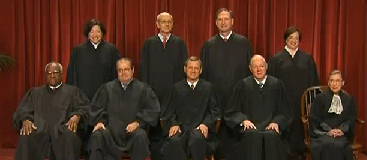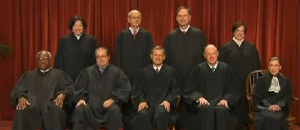Will the Supremes Axe the Voting Rights Act?

Last week the Supreme Court listened to the arguments in a case titled Shelby County, AL v Eric Holder and it was a challenge of the constitutionality of Section 5 of the Voting Rights Act of 1965. In an earlier column I wrote about the necessity of keeping both Section 5 and the entire Voting Rights Act. I also wrote that I felt the Act needed to be extended to the entire country to protect voters from a lot of the funny stuff that goes on during elections.
After the hearing, though, the mainstream media was quick on the trigger and pretty much wrote obituaries for the VRA citing various comments made by individual judges. I thought the “boys on the bus” were too uniformly singing the same tune so I decided to read the transcript of the hearing to see if the justices had said what was being reported in the news.
Well, some of what reporters were saying was accurate but there was a great deal that the justices said that was not reported in newspapers and on television. Frankly, a good, thorough reading of that day’s transcript left me curious about why the “mainstream” media said what they did?
For instance, it appears that Justices Scalia, Sotomayor, Roberts, Kennedy and Kagan all asked questions insinuating that maybe the VRA should have a broader application. All of these justices discussed examples of illegal, discriminatory, or questionable election behavior that had occurred outside the states covered under Section 5. It appeared that there was uniform concern that the 1965 criteria used for approving Section 5 originally were outdated and new criteria were needed.
Shelby County argued that times had changed and racism does not exist in the South as it did in 1965. I agree. Racism does not exist in the South or anywhere else in the same manner as it did in 1965. Racism does exist today; it’s just practiced differently than it was before 1965. Today racism is color-blind or, as discovered during the Texas redistricting trial of 2012, hidden behind closed doors. A majority of the justices even seemed to indicate that although the 1965 criteria are outdated other forms of discrimination in the election process exist so much so that the 2006 reauthorization vote was overwhelming approved by the Congress. Additionally, 15,000 pages of findings supported the Senate’s reauthorization vote.
Frankly, Shelby County’s argument sounded more like a “cry baby” whining or some little kid wanting to “take their football and go home” because the other kids don’t want to let them play due to their lack of athleticism.
The Supreme Court has a weighty decision to make here. It is clear in the transcript that discrimination has played a historical role in vote dilution throughout the states of the old confederacy. This discrimination is based in the evil history of slavery and its legacy that is seen every day throughout this region. All one has to do is visit the various cities and countrysides in this region to understand what I am saying. Without mentioning the states, cities or towns that I have personally visited over the last 40 years I can unequivocally state that racism is alive and well in this region. My discussions with elected officials, both white and black, indicate clearly that these two races do not have equal voices in the policy processes. One can still sense the tensions between blacks and whites in almost every social area. Segregated schools, churches and other social institutions still exist. Resentment exists where white politicians reign over large black communities and vice-versa.
But, the Shelby County case is much more about the relations between whites and blacks. America has changed dramatically since the War Between the States. New demographic and ethnic groups have arrived on the scene changing the political equation at all levels of government and in many states of the union beyond those of the old confederacy. Since the 1970s incidents of racial discrimination in the electoral process have surfaced in jurisdictions across the United States not covered under Section 5. On one level, the Shelby County attorneys have a point about being singled out as being guilty of an offense while leaving the remainder of the states overlooked.
I really feel that the Supreme Court will not overturn Section 5. As a matter of fact I hope the Supreme Court would look at the bigger picture and focus on the discrimination that occurs throughout the country at every level of the electoral process and direct the Congress to craft legislation that will outlaw such behaviors comprehensively. I feel that we not only need to have a Section 5-like law that covers and protects the voting rights of African Americans but all other groups that are being victimized by those little people who see only electoral gain and control of the policy process as their privilege and not a right belonging to all the people of this great country.


